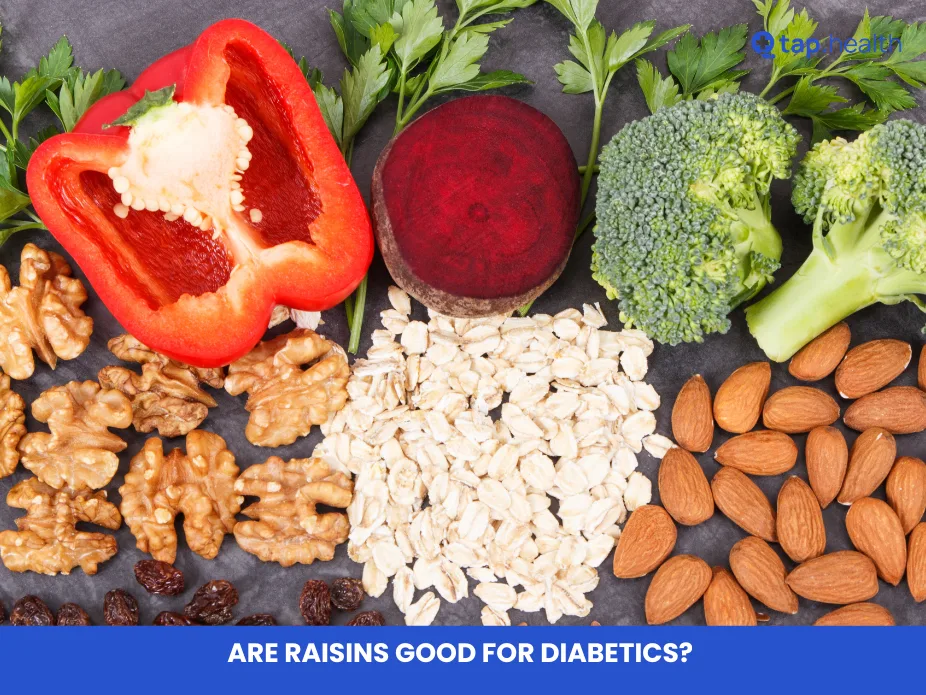If you have diabetes, managing your blood sugar is essential, and food plays a huge role in this process. As you navigate the grocery store or browse snack options, you may come across raisins, the small, wrinkled, dried grapes that are popular in snacks, salads, and baked goods. But the question arises: Are raisins good for diabetics?
Raisins are a convenient and tasty snack, but they are also high in natural sugars, which may concern people with diabetes. In this post, we’ll dive into whether raisins are a healthy option for people managing blood sugar, how they affect glucose levels, and offer expert advice on incorporating raisins into a diabetic diet.
What Are Raisins and How Are They Made?
Raisins are dried grapes, and they are typically made by drying grapes in the sun or through artificial drying processes. These little bites of sweetness are packed with fiber, vitamins, minerals, and antioxidants. Raisins come in several varieties, including golden raisins, dark raisins, and black raisins, depending on the type of grape used and the drying method.
Raisins are often used as a snack, added to cereal or yogurt, or incorporated into baked goods. While they offer many nutritional benefits, they are also high in natural sugars and carbohydrates, making it essential for diabetics to consider how they affect blood sugar before indulging.
Nutritional Profile of Raisins
Let’s first break down the nutritional content of raisins to better understand what they provide.
A standard 1/4 cup serving of raisins (about 40 grams) contains:
- Calories: 120
- Carbohydrates: 32 grams
- Fiber: 1.6 grams
- Sugars: 29 grams
- Protein: 1 gram
- Fat: 0.1 grams
As you can see, raisins are relatively high in sugar, with most of it coming from natural sugars in the grapes. Despite their high sugar content, raisins also provide a good amount of fiber, which can help with digestion and improve blood sugar control.
However, this also means that eating raisins in large quantities could lead to blood sugar spikes, so portion control is important for people with diabetes.
Read this blog –
Glycemic Index of Raisins and Blood Sugar
One of the most important factors to consider when eating food as a diabetic is the glycemic index (GI), which measures how quickly a food raises blood sugar levels. Foods with a high GI cause a rapid rise in blood sugar, while foods with a low GI result in a slower, more gradual increase.
Raisins have a moderate glycemic index, typically ranging from 50 to 64. This places them in the medium category, meaning they can cause a moderate increase in blood sugar when eaten alone or in large quantities. However, this can vary based on how raisins are consumed and other foods they are paired with.
To reduce the glycemic impact, experts recommend pairing raisins with foods that contain protein or healthy fats, such as nuts or cheese, which can help slow the absorption of sugars into the bloodstream.
Are Raisins Good for Diabetics?
The simple answer is yes, but only in moderation. Raisins have a number of health benefits, including providing fiber, antioxidants, and essential minerals like potassium and iron. However, because of their relatively high sugar and carbohydrate content, they should be consumed carefully by individuals managing blood sugar levels.
Health Benefits of Raisins for Diabetics:
- Rich in Fiber: Raisins contain a decent amount of fiber, which can help regulate digestion and improve gut health. Fiber also helps slow down the absorption of sugar into the bloodstream, which can help prevent sharp spikes in blood sugar levels.
- Packed with Antioxidants: Raisins are rich in antioxidants, such as polyphenols, which can help reduce inflammation in the body and lower the risk of heart disease. People with diabetes are at a higher risk for heart problems, so antioxidant-rich foods are beneficial.
- Good Source of Potassium: Potassium is an essential mineral that helps regulate blood pressure. Since people with diabetes are more prone to high blood pressure, eating potassium-rich foods like raisins can offer additional benefits.
- Natural Energy: Due to their high sugar content, raisins provide a quick source of natural energy. This can be helpful for people who need a small boost in energy without resorting to processed sugary snacks.
Risks of Eating Raisins for Diabetics:
While raisins offer benefits, there are some concerns about consuming them regularly:
- High Sugar Content: One of the biggest concerns with raisins is their high natural sugar content. In large quantities, they can significantly raise blood sugar levels, especially if they are consumed without pairing them with other nutrients like protein or healthy fats.
- Calorie Density: Raisins are calorie-dense, which means they are packed with energy in a small portion. This makes it easy to overeat, especially since they’re often mixed into granola, oatmeal, or baked goods. Overeating raisins can contribute to unwanted weight gain, which can worsen insulin resistance in people with Type 2 diabetes.
Real-life Scenarios: Can Diabetics Enjoy Raisins?
Let’s consider a couple of real-life scenarios to see how diabetics can incorporate raisins into their diet while keeping blood sugar levels in check.
Scenario 1: Jane’s Afternoon Snack
Jane is a 55-year-old woman with Type 2 diabetes. She loves snacking in the afternoon but wants to keep her blood sugar under control. She often reaches for a handful of raisins but has noticed that when she eats a large portion, her blood sugar spikes. After talking to her dietitian, Jane learns that portion control is key. She starts measuring out a small serving of raisins (about 1 tablespoon, or roughly 10 grams) and pairs them with a small handful of almonds. This combination of raisins and nuts helps her feel satisfied while keeping her blood sugar levels steady.
Scenario 2: Mark’s Healthy Breakfast
Mark is a 40-year-old man with Type 1 diabetes. He enjoys adding raisins to his morning oatmeal for some extra sweetness and fiber. However, he used to dump a generous handful of raisins into his bowl without considering the effect on his blood sugar. After reviewing his blood sugar readings with his doctor, Mark decides to cut back on the amount of raisins he uses. Now, he adds just a small portion (about 2 tablespoons) and combines it with chia seeds and a bit of unsweetened almond milk. This balanced breakfast keeps his blood sugar levels in check while still offering the sweet flavor he enjoys.
Expert Contributions: Are Raisins Safe for Diabetics?
Dr. David A. Joffe, a diabetes expert and endocrinologist, explains that raisins can be a healthy snack option for diabetics when consumed in moderation. He recommends that people with diabetes use portion control and combine raisins with other foods that help balance blood sugar levels. For instance, pairing raisins with a protein source like nuts or cheese can help prevent rapid increases in blood sugar.
Dr. Joffe also notes that raisins, while high in sugar, offer essential nutrients that are beneficial for overall health, including antioxidants and potassium. However, diabetics should monitor their blood sugar levels after consuming raisins to understand how they affect their individual glucose response.
Tips for Including Raisins in a Diabetic Diet
If you’re wondering how to enjoy raisins without spiking your blood sugar, here are some expert recommendations:
- Limit Portion Sizes: Stick to a small serving, such as 1 to 2 tablespoons of raisins at a time. This helps keep your carbohydrate intake under control.
- Pair Raisins with Protein: Combine raisins with protein or healthy fats to slow down the absorption of sugars. A small handful of almonds or a piece of cheese can help balance out the natural sugars in raisins.
- Eat Raisins with Fiber-Rich Foods: Since raisins are already high in fiber, pairing them with other fiber-rich foods like whole grains or vegetables can help stabilize blood sugar.
- Opt for Unsweetened Raisins: When possible, choose raisins without added sugar. Some varieties of raisins are coated with extra sugar, which can increase the glycemic load and lead to higher blood sugar levels.
- Watch for Hidden Sugars in Products: If you’re using raisins in recipes like baked goods or granola bars, be mindful of other added sugars in those products, which can compound the effects on blood sugar.
FAQ on Are Raisins Good for Diabetics?
1. Are raisins good for diabetics?
Raisins can be part of a diabetic diet when consumed in moderation. They provide fiber, antioxidants, and essential minerals but should be eaten in small portions to avoid blood sugar spikes.
2. Do raisins raise blood sugar?
Yes, raisins contain natural sugars and carbohydrates, which can raise blood sugar levels. However, their moderate glycemic index means they cause a slower increase in blood sugar compared to high-GI foods.
3. How many raisins can a diabetic eat?
Diabetics should stick to small portions—about 1 to 2 tablespoons of raisins at a time—to prevent a significant rise in blood sugar.
4. Can I eat raisins with Type 2 diabetes?
Yes, you can enjoy raisins in moderation. Pair them with protein or fiber-rich foods to help balance blood sugar levels.
5. Are raisins healthy?
Yes, raisins are healthy in moderation. They provide fiber, antioxidants, potassium, and iron, which contribute to overall health. Just be mindful of their sugar content.
In conclusion, raisins can be a healthy snack for diabetics when consumed in moderation. They offer several health benefits, including fiber, antioxidants, and essential minerals, but their natural sugar content means portion control is important. By combining raisins with protein or healthy fats, diabetics can enjoy this delicious snack without negatively affecting their blood sugar levels.
For more information on managing diabetes, visit the American Diabetes Association website.




